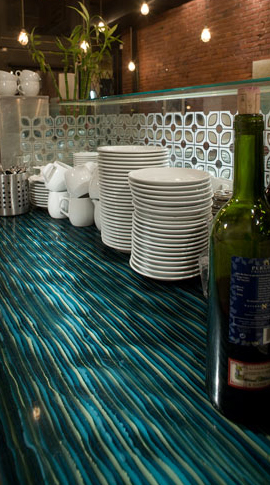Countertop
Countertops, also known as benchtops (in Australia and New Zealand) or worktops (in the UK), are horizontal surfaces used in kitchens, bathrooms, lavatories, or workrooms. The primary function of countertops is to provide a durable and stable surface for working, cooking, or storing items. They are a critical component of interior design, contributing both functionality and aesthetic appeal to the spaces they occupy.
Materials[edit | edit source]
Countertops can be made from a wide range of materials, each with its own set of characteristics, including durability, maintenance, and appearance. The choice of material can significantly affect the countertop's performance and style.
- Granite: A popular choice for its unique beauty and durability. Granite countertops are known for their resistance to heat, scratches, and stains when properly sealed.
- Laminate: Made from layers of plastic bonded to particleboard, laminate countertops offer a wide variety of colors and patterns at a more affordable price point. However, they are less resistant to heat and scratches.
- Marble: Valued for its timeless beauty, marble is a luxurious choice that requires more maintenance due to its porous nature, making it susceptible to stains and scratches.
- Quartz: An engineered stone product that combines natural quartz with polymer resins, resulting in a highly durable surface that does not require sealing. Quartz countertops are available in a wide range of colors and patterns.
- Solid Surface: Made from acrylic or polyester resins, solid surface countertops can mimic the appearance of natural stone, wood, or even glass. They are non-porous and can be easily repaired if scratched or damaged.
- Wood: Butcher block or wood countertops add warmth and character to a space. They require regular maintenance, including oiling, to prevent drying and cracking.
- Stainless Steel: Favoured in professional kitchens for its hygienic and heat-resistant properties. Stainless steel countertops are durable and easy to clean but can be prone to scratching.
Design and Installation[edit | edit source]
The design of countertops involves considering the space's layout, the material's aesthetics, and the intended use of the surface. Countertops can be custom-made to fit specific dimensions and shapes, including unique edge profiles like bullnose, beveled, or ogee edges, which add to the countertop's visual appeal.
Installation of countertops requires precision and expertise, especially for heavy materials like granite or marble, which may need additional support structures. It is often recommended to hire professionals for the installation process to ensure the countertop is properly fitted and secured.
Maintenance[edit | edit source]
The maintenance required for countertops varies by material. Natural stone countertops like granite and marble need regular sealing to prevent staining. Laminate and solid surface countertops can be cleaned with mild soap and water, while stainless steel may require special cleaners to avoid scratching the surface. Wood countertops require regular oiling to maintain their finish and prevent drying.
Environmental Considerations[edit | edit source]
Sustainability is an increasing concern in countertop materials. Options like recycled glass or composite materials offer an eco-friendly alternative to traditional materials. Additionally, the longevity and durability of a countertop material can also contribute to its sustainability, as longer-lasting materials reduce the need for frequent replacements.
Search WikiMD
Ad.Tired of being Overweight? Try W8MD's physician weight loss program.
Semaglutide (Ozempic / Wegovy and Tirzepatide (Mounjaro / Zepbound) available.
Advertise on WikiMD
|
WikiMD's Wellness Encyclopedia |
| Let Food Be Thy Medicine Medicine Thy Food - Hippocrates |
Translate this page: - East Asian
中文,
日本,
한국어,
South Asian
हिन्दी,
தமிழ்,
తెలుగు,
Urdu,
ಕನ್ನಡ,
Southeast Asian
Indonesian,
Vietnamese,
Thai,
မြန်မာဘာသာ,
বাংলা
European
español,
Deutsch,
français,
Greek,
português do Brasil,
polski,
română,
русский,
Nederlands,
norsk,
svenska,
suomi,
Italian
Middle Eastern & African
عربى,
Turkish,
Persian,
Hebrew,
Afrikaans,
isiZulu,
Kiswahili,
Other
Bulgarian,
Hungarian,
Czech,
Swedish,
മലയാളം,
मराठी,
ਪੰਜਾਬੀ,
ગુજરાતી,
Portuguese,
Ukrainian
Medical Disclaimer: WikiMD is not a substitute for professional medical advice. The information on WikiMD is provided as an information resource only, may be incorrect, outdated or misleading, and is not to be used or relied on for any diagnostic or treatment purposes. Please consult your health care provider before making any healthcare decisions or for guidance about a specific medical condition. WikiMD expressly disclaims responsibility, and shall have no liability, for any damages, loss, injury, or liability whatsoever suffered as a result of your reliance on the information contained in this site. By visiting this site you agree to the foregoing terms and conditions, which may from time to time be changed or supplemented by WikiMD. If you do not agree to the foregoing terms and conditions, you should not enter or use this site. See full disclaimer.
Credits:Most images are courtesy of Wikimedia commons, and templates, categories Wikipedia, licensed under CC BY SA or similar.
Contributors: Prab R. Tumpati, MD





